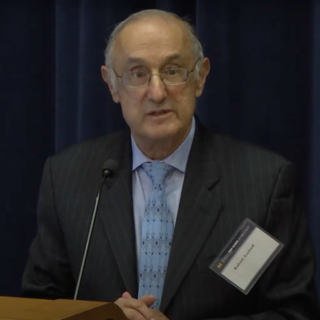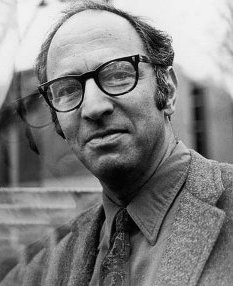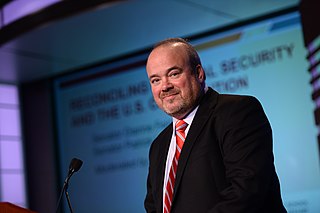Related Research Articles
William Harrison Riker was an American political scientist known for applying game theory and mathematics to political science. He helped establish University of Rochester as a center of the behavioral revolution in political science.

Presidential elections were held in the United States on November 6, 1888. Republican nominee Benjamin Harrison, a former U.S. senator from Indiana, defeated incumbent Democratic President Grover Cleveland of New York. It was the third of five U.S. presidential elections in which the winner did not win the national popular vote, which would not occur again until the 2000 US presidential election. Cleveland was the last incumbent Democratic president to lose reelection until Jimmy Carter in 1980.

George Philip Lakoff is an American cognitive linguist and philosopher, best known for his thesis that people's lives are significantly influenced by the conceptual metaphors they use to explain complex phenomena.

Kenneth Joseph Arrow was an American economist, mathematician and political theorist. He received the John Bates Clark Medal in 1957, and the Nobel Memorial Prize in Economic Sciences in 1972, along with John Hicks.
Public choice, or public choice theory, is "the use of economic tools to deal with traditional problems of political science." It includes the study of political behavior. In political science, it is the subset of positive political theory that studies self-interested agents and their interactions, which can be represented in a number of ways—using standard constrained utility maximization, game theory, or decision theory. It is the origin and intellectual foundation of contemporary work in political economics.

Robert Marshall Axelrod is an American political scientist. He is Professor of Political Science and Public Policy at the University of Michigan where he has been since 1974. He is best known for his interdisciplinary work on the evolution of cooperation. His current research interests include complexity theory, international security, and cyber security. His research includes innovative approaches to explaining conflict of interest, the emergence of norms, how game theory is used to study cooperation, and cross-disciplinary studies on evolutionary processes.
William Julius Wilson is an American sociologist, a professor at Harvard University, and an author of works on urban sociology, race, and class issues. Laureate of the National Medal of Science, he served as the 80th President of the American Sociological Association, was a member of numerous national boards and commissions. He identified the importance of neighborhood effects and demonstrated how limited employment opportunities and weakened institutional resources exacerbated poverty within American inner-city neighborhoods.
The Chicago school of economics is a neoclassical school of economic thought associated with the work of the faculty at the University of Chicago, some of whom have constructed and popularized its principles. Milton Friedman and George Stigler are considered the leading scholars of the Chicago school.

Cass Robert Sunstein is an American legal scholar known for his work in constitutional law, administrative law, environmental law, and behavioral economics. He is also The New York Times best-selling author of The World According to Star Wars (2016) and Nudge (2008). He was the administrator of the White House Office of Information and Regulatory Affairs in the Obama administration from 2009 to 2012.

The 1966 United States House of Representatives elections was an election for the United States House of Representatives on November 8, 1966, to elect members to serve in the 90th United States Congress. They occurred in the middle of President Lyndon B. Johnson's second term. As the Vietnam War continued to escalate and race riots exploded in cities across the country, Johnson's popularity had fallen, and the opposition Republican Party was able to gain a net of 47 seats from Johnson's Democratic Party, which nonetheless maintained a clear majority in the House. This was also the first election that occurred after the Voting Rights Act of 1965 became law, the first time since 1870 that a Republican won a House seat in Arkansas, and the first since 1876 that the party did so in South Carolina.

Theda Skocpol is an American sociologist and political scientist, who is currently the Victor S. Thomas Professor of Government and Sociology at Harvard University. She is best known as an advocate of the historical-institutional and comparative approaches, as well as her "state autonomy theory". She has written widely for both popular and academic audiences. She has been President of the American Political Science Association and the Social Science History Association.

Martin Emil Marty is an American Lutheran religious scholar who has written extensively on religion in the United States.
William John Thomas Mitchell is an American academic. Mitchell is the Gaylord Donnelley Distinguished Service Professor of English and Art History at the University of Chicago. He was the editor of Critical Inquiry for 42 years, from 1978 to 2020, and also contributes to the journal October.
An independent voter, often also called an unaffiliated voter or non-affiliated voter in the United States, is a voter who does not align themselves with a political party. An independent is variously defined as a voter who votes for candidates on issues rather than on the basis of a political ideology or partisanship; a voter who does not have long-standing loyalty to, or identification with, a political party; a voter who does not usually vote for the same political party from election to election; or a voter who self-describes as an independent.
This is the chronological list of books by the Austrian school economist and philosopher Friedrich Hayek. The dates in brackets are the original year of publication of the book.

Thomas Samuel Kuhn was an American historian and philosopher of science whose 1962 book The Structure of Scientific Revolutions was influential in both academic and popular circles, introducing the term paradigm shift, which has since become an English-language idiom.

Jane Jebb Mansbridge is an American political scientist. She is the Charles F. Adams Professor of Political Leadership and Democratic Values in the Kennedy School of Government at Harvard University.
Benjamin Ingrim Page is the Gordon S. Fulcher professor of decision making at Northwestern University. His interests include American politics and U.S. foreign policy, with particular interests in public opinion and policy making, the mass media, empirical democratic theory, and political economy. In 2014, Page, alongside co-author Martin Gilens, appeared on The Daily Show to discuss their study that found the policy-making process of American politics is dominated by economic elites.
David William Rohde is an American political scientist and the Ernestine Friedl Professor of Political Science in the Trinity College of Arts and Sciences at Duke University. He has researched various aspects of American politics, including the Supreme Court and Congress. Before joining the faculty at Duke, he taught at Michigan State University (MSU) from 1970 to 2005. At MSU, he started the program "Political Institutions and Public Choice", which focused on encouraging collaborative research between faculty members and students. He started the same program at Duke when he joined their faculty in July 2005. He was the editor-in-chief of the American Journal of Political Science from 1988 to 1990.

Lawrence R. Jacobs is an American political scientist and founder and director of the Center for the Study of Politics and Governance (CSPG) at the University of Minnesota. He was appointed the Walter F. and Joan Mondale Chair for Political Studies at the University of Minnesota's Humphrey School of Public Affairs in 2005 and holds the McKnight Presidential Chair. Jacobs has written or edited, alone or collaboratively, 17 books and over 100 scholarly articles in addition to numerous reports and media essays on American democracy, national and Minnesota elections, political communications, health care reform, and economic inequality. His latest book is Democracy Under Fire: Donald Trump and the Breaking of American History. In 2020, he was elected a Fellow of the American Academy of Arts and Sciences.
References
- ↑ "Book of Members, 1780–2010: Chapter A" (PDF). American Academy of Arts and Sciences. Retrieved April 14, 2011.
- ↑ "News - NAS".
- Breznick, Alan. 2004. "John Aldrich." Dialogue (Duke University), 30 April.